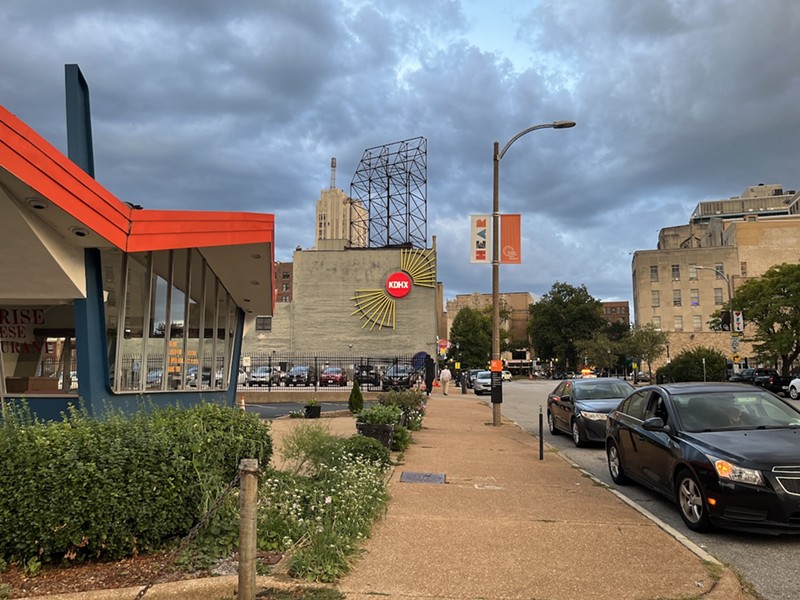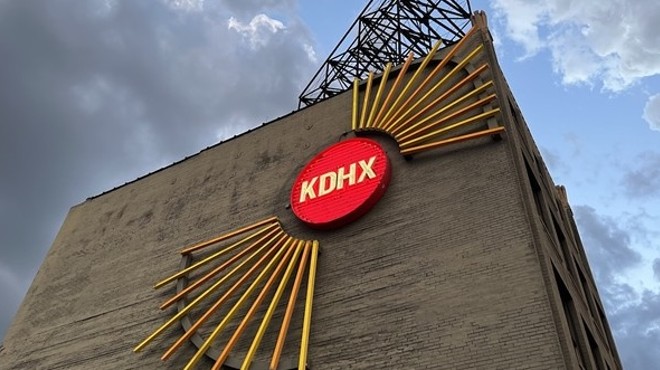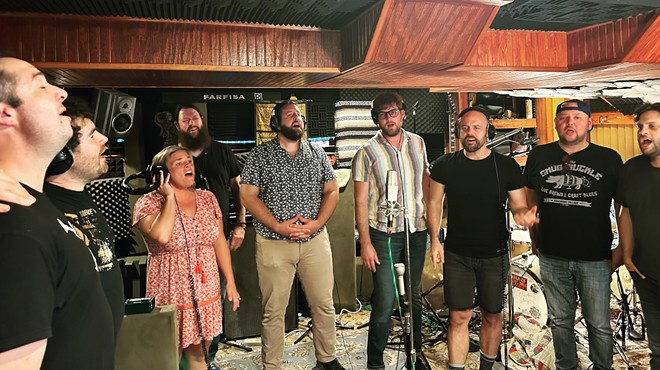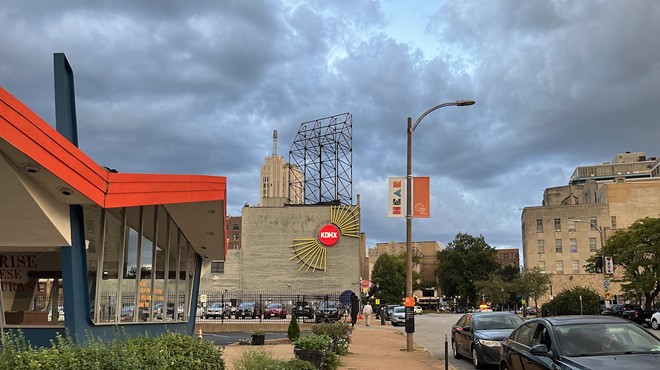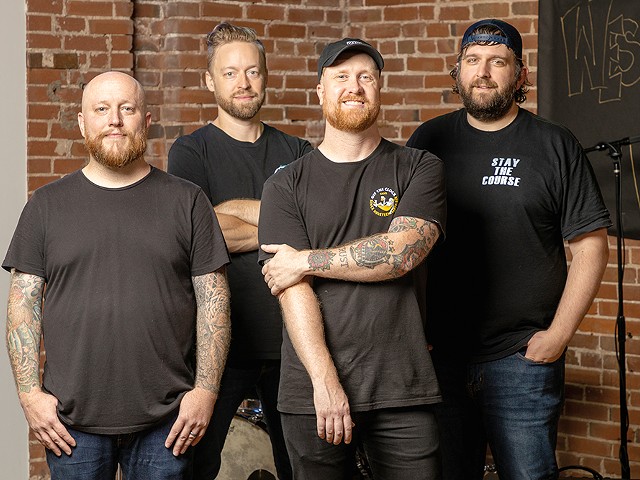The appearance came on the station's new Tangazo show, a group discussion-based program initially created as a podcast for KDHX in 2018 that was moved to the airwaves last week. Wells' interview had been promoted with a call for people to write in with any questions they might have in the wake of a turbulent 12 months that saw large swaths of longtime volunteers depart the airwaves (some voluntarily, some not) amid criticism from even larger swaths of the listening public — including a third of the station's now-former donors and more than 150 local business leaders — over what they see as poor leadership, with Wells and Board President Gary Pierson at the center of those complaints.
Host Hank Thompson brought Wells on at the top of the 1 p.m. hour, along with the station's underwriting account executive, Jesse Hebisen, whom Wells apparently sometimes calls "Pork Chop."
Thompson started the show by introducing Wells as the "general manager of this fine station" before pontificating about how that must be a hard position in an organization staffed by mostly volunteers, who "feel like they have some equity coming, I guess, whether they do or not."
"It gets blurred in a volunteer situation," Thompson went on to add. "People assume authorities that aren't really there."
Wells and Hebisen replied with a bunch of words that essentially amounted to "volunteers are good," with Hebisen offering that those folks' not being paid "allows them a freedom that they wouldn't be able to get as employees," a sentiment with which Wells agreed.
"That's the beauty of it," Wells said. "The agency that folks can have on air, the autonomy that people can have, too. You can say what you want to say, people can play the music — 'unbridled' is the word." This would seem to fly in the face of the fact that some now-former volunteer DJs were fired specifically for things they allegedly said on the air — and were also asked to sign a formal volunteer agreement stipulating what they could and could not say.
After offering that Wells has had a "tough road" and remarking on her "nice smile" through it all, Thompson insisted that he's "not carrying water here, as somebody would suggest," and then began reading verbatim from a recent press release touting what the station's leadership sees as the organization's recent accomplishments, with lofty talk of a "bold new vision to harness the power of music to create a better St. Louis," and efforts to "amplify underrepresented voices in music," and so on.
Wells acknowledged that 2023 was a year of change and transformation at the station, and that it hasn't come without difficulty. But she also saw some upsides.
"We have had wonderful opportunities here, and it is a time of inspiration at KDHX," she said. "You mentioned all the new voices that you hear on the radio, and we have leaned into the opportunity to say, 'How do we continue to use the airwaves to deflect'" — she then corrected herself — "to reflect, not to deflect, 'the community and the people that are in it.'"
Thompson then noted that Wells has run into "a lot of opposition as you are moving forward in realizing the mission," seemingly conflating, as Wells and Pierson often do, the DJ firings and resignations and subsequent community outrage — which were centered around criticism of Wells and KDHX's board — with the station's efforts to diversify the station and better reflect the community it serves, a push that followed accusations of racism and racial insensitivity against Wells herself from a group of Black former KDHX staffers and volunteers in 2019.
Thompson inadvertently reminded some of Wells' critics of that history with a seemingly innocent question: "Where do you think the real conflict started?"
After a pregnant pause, a near eternity in radio time, both Wells and Hebisen said that it was "a big question" before Wells remarked, "I don't know if I have a specific answer to that" and pivoted to more talk about "progress" and "bridging barriers," at one point mentioning the killing of Michael Brown in 2014 as a catalyst for change at the station, which notably happened a full five years before those accusations of racism were leveled against her.
Thompson then turned his attention to Hebisen, remarking that the "negative noise" of the last year has surely impacted his ability to raise funds for the station. Hebisen said that was "undoubtedly true" but suggested that the money will come as KDHX "continue[s] to live out this mission." The program then went to its first break of the hour, wherein the station aired a spot asking for donations.
Upon returning from the break, Thompson moved to the portion of the program that featured questions from the public, reading them to Wells and Hebisen.
Question one: "I'm sure that the past year has been a tense one for you. Looking back on things, is there anything you wish you would have done differently, and how do you think the station would look/sound today if somebody else was executive director of KDHX?"
Wells replied that she didn't know how it would look or sound differently with someone else, then asserted that she has a "very collaborative leadership style" and is "buoyed and supported by a board and a staff." She did not address the portion of the question that asked if, in hindsight, she would have done anything differently.
Question two: "With a board that has been acting at half capacity, and now about a quarter, why not seat the three candidates elected at the associates' meeting in September? Throwing out whether she believes the meeting was legitimate or not, seating three highly qualified and capable directors should be a no-brainer."
Wells said the processes for how meetings take place and how people are elected are outlined in KDHX's bylaws, and that the board "has a strong commitment to following those processes and procedures."
Question three: "The Double Helix Corporation parent company of KDHX was originally set up with checks and balances and a governance structure that was specifically designed so that no party would have too much power. Its original 1972 bylaws set up a true democratic structure between annual members, donors, associate members, volunteers and the board of directors, all of whom had voting rights to appoint board members, and the associate members would have to approve any bylaw changes by a two-thirds majority. By a 2002 bylaw update, in fact, it had evolved to where annual members (donors) would elect five board members, the associate members (volunteers) would elect six and the board self-appointed four. And still the associate members would have to approve any bylaw changes by a two-thirds majority. Since Kelly Wells has ascended to power, the bylaws have been perverted to the point where the annual members have no voting rights."
"That's the donors that we're talking about there, is that right?" Thompson interjected in the middle of reading the question. "Is that true? Do the annual members, or the donors, have no say-so?"
"We don't use a membership model at KDHX," Wells replied. "So that is true, I guess you could say, because there aren't members."
Thompson resumed reading the question: "Now, where the annual members have no voting rights, the board members self-appoint 12, and the associates are only allotted 3 members to vote on, and all of the associate candidates must be approved by a nominating committee consisting of the board and Kelly Wells. And the board now claims sole ability to make bylaw changes."
Thompson again paused, and asked if Wells or Hebisen wanted to respond.
"I'd just like to say that there was one word right there in the middle of that long statement that was made, and that word was 'evolved,'" Hebisen remarked. "So we talked about 1972 and today is 2024, and yes it has evolved. So there are many things that have happened throughout that history. That was a good summation. I can't speak to how accurate it is or is not, because I don't really know. But what strikes me personally is the evolution of the organization. ... And now here we are."
Wells offered that "many of those things happened before my time" and stressed that the board "has the values of the organization in mind as they work through those processes that are outlined in our bylaws," after which Thompson resumed reading.
"This has led to a shocking imbalance of power in what was supposed to a power-sharing relationship, and a total lack of accountability with a de facto self-perpetuating board. When the community protests her extreme actions the only way it can now, by withholding donations, Kelly Wells blames them for trying to hurt the station. When the associates tried to organize to seek legal remedies to this usurpation of their rights, their leadership was dismissed from the organization and they were denigrated in the press."
Once again, Thompson stopped, apparently responding to the growing frostiness in the room, which was palpable even over the airwaves. "I'm just reading 'em," he said with a nervous laugh, whereupon Hebisen called it "a great statement" and said "thank you."
"Any response to that? None whatsoever? OK," Thompson said before continuing once more to read the question.
"Mr. Thompson, I have admired your work over the years and call upon you to exercise your watchdog duties as a member of the media and to do your due diligence as a member of the community advisory board. What I have described above is the reason that the current controversy exists, an existential crisis."
Thompson then asked if that characterization is accurate. "Are we in a crisis?" he inquired.
"We need money the same way we always have," Hebisen responded. Predictably from a man whose job depends on his ability to raise funds for the station, he then disagreed with the assertion that the only way for the listening public to protest leadership's actions is by withholding donations. "I would say that's not true. There are a lot of ways you can register dissent, and that's only one — and maybe not the most necessary."
Question four: "What has been more damaging to the financial stability of KDHX: Two programmers allegedly discouraging their listeners from supporting the station, or firing those two programmers, plus many more, and ignoring all communications from donors canceling their donations? Why did KDHX leadership not consider the financial fallout of those firings and act in accordance with the overall sustainability of the station, as financial stewardship is the primary responsibility of the executive director and an ongoing challenge for the station?"
Wells said she'd argue with the question's premise, granting that she and the board have a fiduciary duty but arguing that their "higher duty" would be "the responsibility we have to live into the values of this organization and to live into our mission and use those values and mission, and the fact that we are here to serve our entire listening audience, as the foundation for making decisions."
Question five: "How can you claim that your actions at KDHX have only angered a small group of people when there are over 150 local businesses that have signed a letter of discontent with your actions?"
"KDHX has about 65,000 listeners a week," Kelly replied. "I certainly do not want to diminish the feelings and the experiences of groups of people who are frustrated. However, we also are serving a large and wide community." She then touted some of the same talking points from the press release Thompson read from at the beginning of the segment, claiming that online listenership is up and that people are excited for the new direction of the station.
"We appreciate feedback from people in our listening area," Wells said. "But it would not be our full responsibility if we stewarded a small group of people at the — you know, with not listening to the whole community."
Question six: "Ms. Wells has stated that the station has lost more than a third of its donors. Is there any plan other than the constant on-air pleas for money to fill the gap? How long can the station operate at the current funding level?"
Wells responded by saying, essentially, "We are going to fundraise." Thompson then cut to another break, which featured a spot suggesting helpfully that listeners should give their cars to KDHX.
Question seven: "What regional event is KDHX appearing at next?"
"I'm not sure if I know the specifics on that," Wells admitted, before insisting "that is an exciting focus for 2024."
"Let me make sure that I'm clear on this," Thompson replied. "The next regional event is not set yet? Or you're not certain what that will be?"
"Yes, I don't have the next event off the top of my head," Wells confirmed.
The Q&A format kinda fell apart at this point, about 45 minutes in, as Thompson started editorializing. He said he disagreed with much of the criticism he was reading about the person who allows him to have a radio show, and it started to be less clear what was coming from the listenership and what was coming from him.
"Folks speak in broader terms, when it's just, maybe, you know, a couple dozen people that are upset, or something of the sort, you know they try to make it the universe," Thompson said seemingly in summation. "I'm editorializing. I just want to read the questions, but I speak my mind, too."
Asked why a meeting was held with only a week's notice, Wells said she didn't know what meeting the question was referring to. Asked why KDHX doesn't allow associates to elect more than one member to the board, she mentioned the bylaws again. "I'll just keep saying the same thing," she said, making it fairly clear that her patience for answering questions was running thin. Asked about the financials, Wells directed people to the station's website. Asked why it took so long for an anti-racist charter to be adopted by the station, she said, "That was something that we did very intentionally and very carefully because that's not something we take lightly."
"I think you've acquitted yourself pretty well," Thompson said, wrapping things up. "I mean, I'm satisfied."
Wells then offered her own summary to wrap things up.
"I appreciate the opportunity to be here," she said. "It's not hard to talk about KDHX. It's not hard to talk about both the challenges that we face and where we are going, and where we want to go. Again, it's inspirational work, as difficult as it may be at times. I hope that people will continue to tune in and listen to all the wonderful new voices that we have on the air, the incredible music that's coming out of this place.
"And look for us out in the community this year too," she added, "because we're excited for that as well."
The specifics of the next regional event where the public would get the chance to see KDHX out in the community, of course, were never made clear.
Subscribe to Riverfront Times newsletters.
Follow us: Apple News | Google News | NewsBreak | Reddit | Instagram | Facebook | Twitter | Or sign up for our RSS Feed


